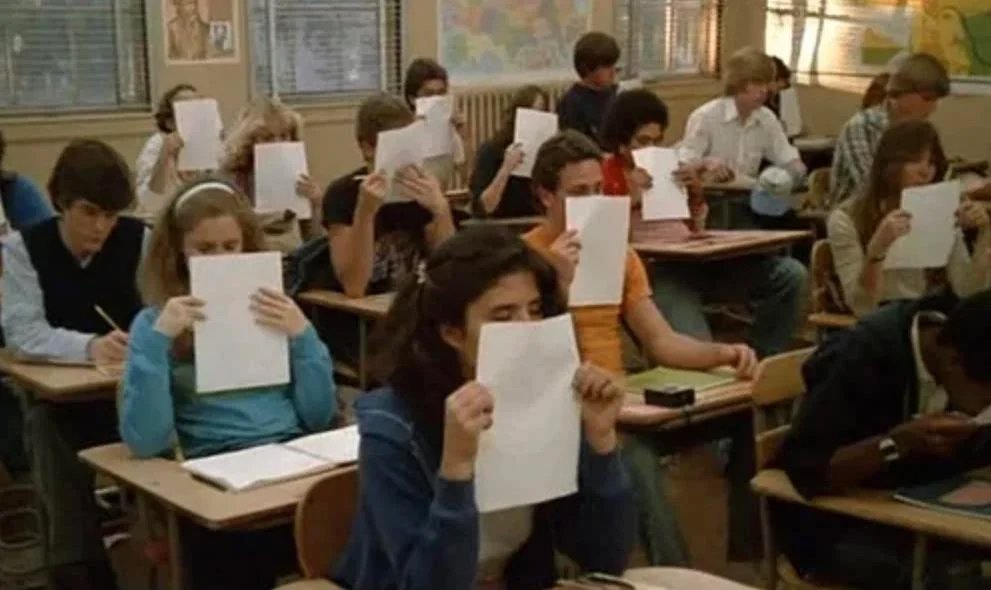20 September 2023
Growing up in the United States in the 1970s, dittos were a staple of my educational experience. Ditto was the proprietary name of a type of spirit duplicator that produced purple-colored copies of a printed page. Dittos had a distinctive, pleasant odor, and it was something of a ritual to smell the sheets of paper that the teacher handed out. But why the name?
Ditto is an early seventeenth-century borrowing from Italian, which in turn is from the Latin dictus, meaning said. The word appears in John Florio’s 1598 Italian-English dictionary, A Worlde of Wordes:
Ditto, sayd, spoken, told. Also a speech or a saying.
Florio, however, is recording the Italian usage, not an English one.
We first see ditto in English writing early in the seventeenth century. It is first used as a substitute for the name of a month that had been previously mentioned. Here is an example from the 1625 collection of travel narratives, Purchas His Pilgrimes:
In the morning at breake of day (to our great admiration) wee saw land to the Westward, bearing North by West fiue leagues off, not once looking for any that way, but to the Eastward for Iuan de noua, which we made account could not be aboue sixe leagues South from vs, and being be-calmed, did doubt least the Current would set vs vpon it in the night: but the day clearing, we found it to be the Northermost Iland of the Angoxas, whence we departed the one and twentieth, ditto in the afternoone, which so amazed our Marriners, as that they were discouraged of getting our Voyage this way.
This usage was quickly adopted for things other than dates and frequently appears to this day in lists and inventories. We can see ditto in prose, referring to a previously mentioned thing, in a sermon on death by Ninian Campbell that was published in 1635:
That sun which ye see setting over your heads, the ebbing and flowing of the sea, which environeth us, that earth whereupon we walk, lately renewed, now growing old; and to come nearer, these graves whereupon yee trode in your entrie, this Church-yard, these through stones, that dead bell, that beir, that dolefull convoy, these two corps, and that wide opened sepulchre, telleth us, that we must die. And as Catullus saith,
—Ostentant omnia lethum. [They all signify death.]
Death is painted with the net of a fowler: and with this ditto, Devoro omnes, I devoure all. All things above us, beneath us, about us, within us, and without us, tell us that we must die.
And in the eighteenth and nineteenth centuries, ditto was used to refer to style of clothing in which all the articles of apparel were of the same color. Here the word used in the London newspaper the Connoisseur of 14 July 1755 saying that suits of ditto were commonly worn by physicians:
We may learn the disposition of a man by his apparel, as we know the trade of a carpenter by his leathern apron, or a soldier by his red coat. When we see a snuff-coloured suit of ditto with the bolus buttons, a metal headed cane, and an enormous bushy grizzle, we as readily know the wearer to be a dispenser of life and death, as if we had seen him pounding a mortar or brandishing a clyster-pipe.
And we see ditto used as a verb, meaning to repeat or echo what someone else has said, in the early nineteenth century. From the Albion (New York) of 28 February 1824:
Mr. Wilson asserted that so far from entertaining any improper intentions towards Mrs. Poolman, he really wouldn’t touch her with a pair of tongs—for she was a scold; and it was solely because she was an arrant scold that he told her husband he pitied him; and as to the kicking, he had threatened only if she should ever enter his apartments again. Mr. Lees, the landlord, dittoed Mr. Wilson’s statement as to Mrs. Poolman’s scolding faculty—she had a tongue enough, he said, to set a whole parish by the ears, and he heartily wished his house was rid of her.
And the trademarked Ditto machine from my childhood is first recorded in 1919. From a classified advertisement in Omaha, Nebraska’s Sunday World-Herald of 19 October 1919:
Ditto Duplicator
New machine, but can be purchased for great deal less than list price. J. E. Beckman. Doug. 346.
Sources:
Advertisement. Sunday World-Herald (Omaha, Nebraska), 19 October 1919, Want Ads 5/3. Readex: America’s Historical Newspapers.
Campbell, Ninian. A Treatise upon Death First Publickly Delivered in a Funerall Sermon, Anno Dom. 1630. Edinburgh: R. Young for I. Wilson, 1635, sig. C2r–v. Early English Books Online (EEBO).
Florio, John. A Worlde of Wordes. London: Arnold Hatfield for Edward Blount, 1598, 110. Early English Books Online (EEBO).
Green’s Dictionary of Slang, 2023, s.v. ditto, n.
Oxford English Dictionary, second edition, 1989, s.v. ditto, n.; third edition, September 2022, s.v. ditto, v.
“Police. Bow Street. Virtue in Danger.” Albion, or British, Colonial, and Foreign Weekly Gazette (New York), 28 February 1824, 292/1–2. Readex: America’s Historical Newspapers.
Purchas, Samuel. Purchas His Pilgrimes in Five Books. London: William Stansby for Henrie Fetherstone, 1625, 335–36. Early English Books Online (EEBO).
Tierney, Grace. “The Many Uses and History of Ditto.” Wordfoolery (blog), 29 May 2023.
Trim, Eutrapelus. The Connoisseur (London), 14 July 1755, 460. Eighteenth Century Collections Online (ECCO).
Image credit: Fast Times at Ridgemont High, Amy Heckerling dir., Universal Pictures, 1982. Fair use of a single low-resolution screenshot from the film to illustrate the topic under discussion.

